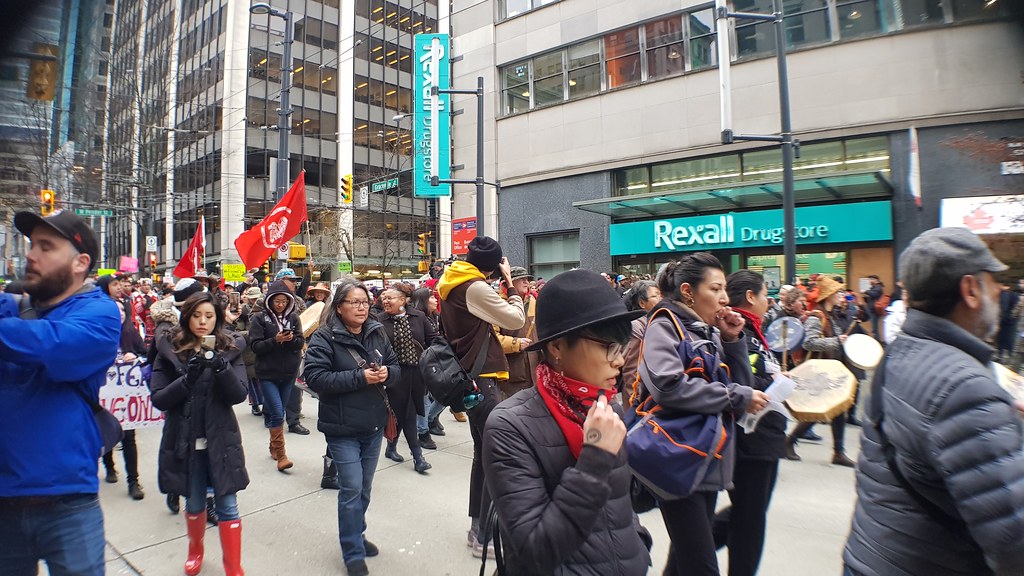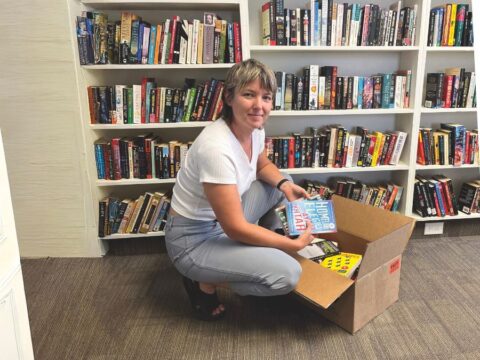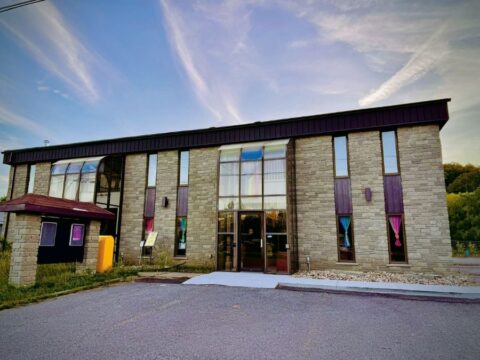There were railway blockades and drumming in the streets. Indigenous and non-Indigenous people marching together on behalf of a small British Columbia First Nation defending its territory. For people of faith among them, it was a chance to offer solidarity. It was also a riveting crash course in Indigenous politics, given the Wet’suwet’en hereditary chiefs’ disagreement with elected chiefs over Coastal GasLink’s (CGL) gas pipeline. And for anyone with an instinct to dig deeper, it was a case study in Indigenous law and history, one more chapter in the long national story of Indigenous land seized as corridors for rail, hydro, or fossil fuel lines.
We learned, for instance, that the Wet’suwet’en (like other First Nations) have two governance structures: one that existed long before settlers arrived, and another, more recent one imposed by Canada’s Indian Act. That makes it complicated for outsiders to know who speaks for the Nation — the traditional chiefs or the elected band councils whose system may seem more familiar to most Canadians.
You may unsubscribe from any of our newsletters at any time.
We also learned that First Nations across the country were willing to go to the wall to support each other. Many non-Indigenous Canadians — perhaps influenced by movements like Idle No More, perhaps by deep unease at injustice — were increasingly eager to join the hereditary chiefs in their efforts to resist the incursion of a new pipeline.
More on Broadview: From the front lines of the Wet’suwet’en struggle
Weeks went by. Finally, alarmed by the protesters’ capacity to hinder rail traffic that flows through their territories, provincial and federal government officials met with the hereditary chiefs. They laid a foundation for discussions about rights and title, including time for those conversations the Wet’suwet’en people would have among themselves. One by one, the RCMP physically removed Wet’suwet’en barriers against CGL’s presence; and soon, railway blockades in other parts of Canada came down.
Then the pandemic struck. Canada’s attention shifted abruptly from railway stoppages to the stoppage of everything.
Except for essential services. And that is the problem. Construction activities are deemed critical in British Columbia. Michael Sawyer of the Citizens’ Oil and Gas Council said in a webinar for pro-Indigenous charity RAVEN that fracked gas — often touted as a transition fuel — is “worse than coal” in terms of greenhouse gas emissions. One study found that shale gas has a carbon footprint that is at least 20 percent greater than that of coal. And given the continent’s “vast oversupply of natural gas,” the B.C. and federal governments have had to offer billions in subsidies just to get the larger LNG Canada project this pipeline serves “up and running,” says Sawyer.
But the more acute problem right now is the pandemic. Work on Coastal GasLink entails a highly mobile workforce entering an area with limited capacity to deal with a COVID-19 outbreak. In an open letter, the Union of British Columbia Indian Chiefs sharply condemns this “corporate exceptionalism” for the “expansion of economic enterprises” which “directly endangers the health and wellbeing of every one of us.”
Dr. David Bowering, former chief medical officer of health for B.C.’s Northern Health region, wrote in an open letter published in Alaska Highway News that industrial work camps in the area are “COVID-19 incubators” which should be shut down, “as we have done with far less risky aggregations of people and workers.”
All this rightly concerns those same people of faith who earlier took to the streets. They were impelled, perhaps, by a yearning to redeem their history. My own denomination, The United Church of Canada, has twice apologized to Indigenous people. We are sorry we did not recognize their powerful spirituality. And we are sorry for the residential schools, our collusion with government efforts to assimilate Indigenous children and sever their connection to their land.
But none of this — a painful history, a pandemic, a pipeline — has dimmed the passionate sense of responsibility the Wet’suwet’en have for their territory. “Our water is still clean,” spokesperson and hereditary chief Freda Huson said in a video interview for the Women’s Earth and Climate Action Network’s YouTube channel. “That’s where our salmon comes from. We need that water to survive.” Speaking in the same RAVEN seminar as Sawyer, hereditary chief Adam Gagnon said it is “just part of our law” to protect that territory.
More on Broadview: Wet’suwet’en defenders provide blueprint during COVID-19
While the B.C. government notes that CGL is lawfully permitted to do its work, Wet’suwet’en title to their land has never been extinguished. One could argue their law should apply on their land. In 2019, B.C. legislators passed a bill implementing the United Nations Declaration on the Rights of Indigenous People (UNDRIP), which demands the “free, prior and informed consent” of Indigenous peoples before undertaking projects that affect them. (UNDRIP was also passed in the House of Commons, although never ratified in the Senate.)
But despite this lack of consent, large quantities of 48-inch pipe continue to arrive in Wet’suwet’en land, as do the workers who unload it and clear the land. In the RAVEN webinar, Gagnon points out that workers fly in and out from other areas, most of them with “a biweekly turnaround, putting everyone in the region at risk.” And Huson, in her Women’s Earth and Climate Action Network interview, notes how area motels are full of construction workers who do not always observe social distance. Rather than slowing down during the pandemic, she says, CGL seems to have “speedtracked” their operation.
There can be no cross-Canada rallies protesting this ongoing work. Not while a fierce virus preoccupies the world. But everyone affected — Indigenous or non-Indigenous, vulnerable elders and CGL workers alike — is endangered by it. They all deserve better.
Broadview is an award-winning progressive Christian magazine, featuring stories about spirituality, justice and ethical living. For more of our content, subscribe to the magazine today.















It’s very suspicious of the possible motive for placing a 48 inch pipe for a supposed gas line!
It seems more applicable for a bitumen transportation size line !